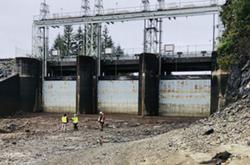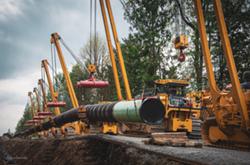Having lived through one eco-catastrophe, and written a book about it, I don’t like what I’m seeing out of COP26.
I’m not referring to the obvious — the absence of Russian and Chinese leaders in Glasgow; the belated baby steps on phasing out coal and reducing methane emissions; or the platitudes about preserving forests or compensating countries that did not contribute to climate change but are hurting most from it.
Important to be sure, but let me explain what I am talking about.
There was a time in Newfoundland and Labrador when it was widely believed that the great Northern cod stock was inexhaustible. As I noted in Lament for an Ocean, it was a tempting conclusion.
After all, the Grand Banks had been fished for 400 years by scores of countries. Many of England’s private mansions in Poole and Exeter have images of the mighty cod carved into the enormous marble mantles above their fireplaces, homage to the species that made the fortunes to build them.
When the stock collapsed, and Newfoundland’s most famous fishery was closed by Ottawa in July 1992, the catastrophe was variously blamed on cold water conditions, cod migrations to other areas, and a handful of other fanciful theories that had the handy benefit of letting the main culprit, the federal Department of Fisheries and Oceans, off the hook.
In the end, the commercial extinction of the Great Northern Cod came down to human greed at many levels. The trawlers that relentlessly exploited the Grand Banks for decades were fishing for dollars. They forgot that they were harvesting living creatures, whose survival depended on prudent stewardship. The managers in Ottawa treated the fishery as the employer of last resort instead of a highly vulnerable resource. The result was too many fishermen chasing too few fish.
The overfishing was massive, both by Canadian fishermen and foreign fleets. Catches were often underreported or misreported. Bycatches were wantonly destroyed. Vessels dragged the spawning grounds with their enormous nets in an attempt to sustain catch rates. Some skippers kept two sets of books.
Maybe worst of all, anecdotal accounts of a pending disaster from the sterns of inshore fishing boats, whose captains were landing skinny and starving cod, were disregarded by federal bureaucrats. The slaughter at sea was enabled by the Department of Fisheries and Oceans. DFO was the owner and manager of the resource on behalf of the people of Canada.
In that capacity, DFO had misinterpreted survey data, and then developed a mathematical model for setting quotas. It turned out to be horribly flawed in its assumptions about the size of the stock and how many cod were dying each year. For more than five disastrous years, Ottawa allowed fishers to decimate the stocks that DFO’s flawed modelling assumed were robust enough to grow the cod population. Socioeconomic goals, not conservation, drove the agenda.
And then there were none. The cod collapse plunged Newfoundland into the greatest economic upheaval since the Great Depression.
This is not just a fish story. The point is that bad information leads to disastrous policy. And that brings us back to COP26. Just as Ottawa couldn’t set proper fish quotas because of bad data and fatally myopic socioeconomic concerns, how can world leaders and their officials in Glasgow set emission targets unless they know exactly how much greenhouse gas is being released into the atmosphere?
Bad data, worse future
An extensive investigation by a team of reporters at the Washington Post found that countries around the world are underreporting their true emissions figures on a massive scale.
The paper established the gap between declared and actual emissions at somewhere between 8.5 and 13.3 billion tonnes of greenhouse gas emissions. At the low end of their number, the gap is larger than the yearly emissions of the United States. At the high end, it approaches the emissions of China, or 23 per cent of the planet’s total GHG emissions.
Why does this matter? In the Newfoundland fishery, bad data on the true state of the stock led by a direct route to an ecological disaster.
It is the same systemic nightmare with underreported data on GHG emissions. If the Post has it right, if the inaccurate data collected by the UN seriously lowballs the problem, the ultimate disaster looms. That’s because governments will use the faulty data to set emission targets that will themselves be woefully inadequate, and not nearly timely enough.
The Post offered several examples of how countries fiddle the numbers in order to give the appearance of reducing their CO2 emissions.
Malaysia is a case in point. In 2016, its GHG emissions amounted to 422 million tonnes. But it reported just 81 million tonnes to the United Nations Framework Convention on Climate Change. How could that be?
Malaysia simply claimed that trees in its territory were absorbing the rest of the CO2. If true, it was something of a miracle. It meant that the Malaysian forest was absorbing four times more CO2 than an even larger forest in neighbouring Indonesia.
UN rules allow this reporting sham. These same rules allow the biggest polluters in the world — China, the United States and Russia — to subtract half-a-billion tonnes of emissions a year by claiming that land within their territory absorbs large amounts of the carbon they are producing. The honour system, or the honour system run amok? Whatever happened to trust but verify?
The fact is the UN’s reporting protocols on GHG are pathetic. For one thing, of 196 countries referenced in the Post investigation, only 45 of them reported their emissions in 2019. That’s because reporting is voluntary. As a result, the UN’s data set on the true state of carbon pollution on a country-by-country basis is like Swiss cheese — full of holes.
As the Post team reports, developing countries are given a total pass. There are no requirements to back up in-country reports with atmospheric or satellite information. And the biggest polluters who do report can play their cards close to the vest if they so choose. And very often they do.
China has only submitted five reports on its GHG emissions, the last one in 2014. Iran, one of the top 10 emitters in the world, last reported in 2010. Not since 2007 has Qatar, a huge natural gas producer in the Persian Gulf, given an account of its emissions.
The Post documents the same reality gap in global in-country underreporting of emissions of methane and so-called “F-gases” or fluorinated gases, which leak from refrigeration, air conditioning and heat pump systems.
And a recent report from Nature Canada and other environmental groups in this country found that Canada is underreporting CO2 emissions from the forestry sector by 80 million tonnes a year.
Lessons from the great cod collapse
Back when I was writing about the cod collapse, I was struck by how the forces of politics and commerce suppressed and eclipsed the scientific advice. Three separate scientific reports predicting the cod collapse, and recommending a dramatic cut in the quota, were in the hands of the federal government before the boats had to be tied up.
Dr. Lee Alverson from Seattle was the scientist who found that DFO had been sanctioning fishing at a much higher mortality rate than it believed. Yet even after Alverson pointed out the deadly flaw in DFO’s mathematical model, successive fisheries ministers continued to set fantasy-land quotas for both the inshore and offshore cod fishery. The industry was just too big to fail; until it did.
Here’s one for Ripley’s Believe It or Not. The last cod quota before the stock collapsed was a jaw-dropping 266,000 metric tonnes. In the end, God closed the fishery, not politician John Crosbie. You can’t catch what isn’t there.
So it is remarkable, nearly 30 years later, that science is once again being trumped by bad data, politics and Pollyanna pledges when it comes to climate change. This is not about optimists and cynics, pragmatists and scoffers, dreamers and schemers. This is about the consequences of willful rejection of the facts.
The Sixth Assessment Report of the Intergovernmental Panel on Climate Change, or AR6, is full of evidence that those who want to kick the can down the road are fatally wrong. The report is full of evidence that at current global temperatures, there have already been irreversible consequences for the planet. Humans have already tipped a few tipping points.
The AR6 concluded with very high confidence that the melting of mountain and polar glaciers will continue for decades, if not centuries.
With the world’s oceans absorbing more and more human-generated CO2, they are set on a path to continue warming for decades. That brings deep ocean acidification and deoxygenation — and sooner rather than later, death to marine life. Think of coral reefs.
Loss of permafrost carbon following permafrost thaw is irreversible at centennial time scales, a conclusion AR6 scientists reached with high confidence.
Who’s the real cynic?
At a press conference, Prime Minister Justin Trudeau has called questioning the efficacy and value of Canada’s response to climate change at COP26 “cynical.”
How could journalists not be cynical? Canada has missed every climate target it has set. It has the worst record of any G7 country on that score. And what both Trudeau and his Environment Minister Steven Guilbeault promised in Glasgow, to cap oil and gas emissions, misdirects attention from the real issue: capping production.
Here is the point.
In 2020, Canada exported 3.7 million barrels of oil, the lion’s share from the tarsands, to the United States. If we don’t cap production, but only emissions from the oil and gas sector in this country, Canada may advance toward the national goal of net-zero emissions by 2050. But Canadian oil, most of it of the dirty variety, will continue to be burned in the U.S.
How does that help global warming? The reason Greta Thunberg gave COP26 failing grades is because the world needs to stop developing and burning fossil fuels.
Profiting from someone else doing the combusting hurts everyone. Here’s how engineer and climate advocate Walter Bauer put Canada’s strategy to The Tyee.
“A GP insists you go on a diet to reduce your weight by 30 per cent by end of the year. Unbothered by your earlier proclamation that ‘nobody in their right mind would leave those doughnuts uneaten,’ you confidently declare, ‘I’ll lose 40 to 45 per cent by the end of the year.’ Rather than reduce your caloric intake, you increase your doughnut consumption and undergo liposuction surgeries on pace to meet your target. After several months, you find your exploits are unhealthy and cost prohibitive.”
The last part of Bauer’s quote refers to how Canada plans to cap emissions in the oil and gas sector: carbon capture and storage. The energy sector has already asked Ottawa to pay for 75 per cent of these expensive and dubious facilities. The opposite of the concept of polluter pay.
Author Paul Hawken’s 2017 book Drawdown has become a seminal text on the fight against global warming. The author offers 80 solutions to climate change. The list doesn’t include carbon capture. Here’s why.
“A significant number of forecasts rely on nascent technologies that capture carbon dioxide from the air, liquefy it and pump it deep underground. As much as one might wish there was a third way, one in which 30 million carbon removal machines operating 24-7 until 2100 are installed across the world…. that hope is unrealistic, a type of thinking promoted primarily by fossil-fuel companies.”
There is a reason David Suzuki didn’t go to COP26. Suzuki cheered on Trudeau in Paris in 2015. Two years later, he watched the PM buy a pipeline.
As the political blah, blah, blah goes on and on, scientists all over the world are keeping a keen eye on the atmosphere and what it now contains.
In May 2021, scientists at the Scripps Institution of Oceanography found 419 parts per million of CO2 in Earth’s atmosphere, the highest reading ever recorded. At 450 ppm, bad things begin to happen.
How ironic that as Glasgow hosts COP26, politicians in the U.K. are anxious to develop the Cambo oil field in offshore Scotland, which is believed to hold 800,000 barrels of oil.
The skinny? Politicians and short-term thinkers are still in charge, and still lust after applause for their half measures on climate change. They believe they can go on burning oil and gas for decades and beat off their critics with platitudes about transitioning to clean energy, and the need to do more.
They would have fit very nicely into the Department of Fisheries and Oceans circa 1985, when the epitaph for Northern Cod was being written by people who never comprehended the majesty of that legendary stock of fish, or how human activity was destroying it. ![]()
Read more: Politics, Environment
















Tyee Commenting Guidelines
Comments that violate guidelines risk being deleted, and violations may result in a temporary or permanent user ban. Maintain the spirit of good conversation to stay in the discussion.
*Please note The Tyee is not a forum for spreading misinformation about COVID-19, denying its existence or minimizing its risk to public health.
Do:
Do not: